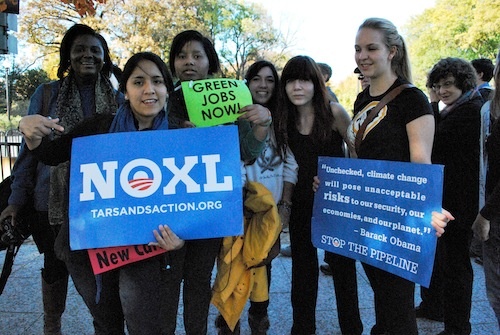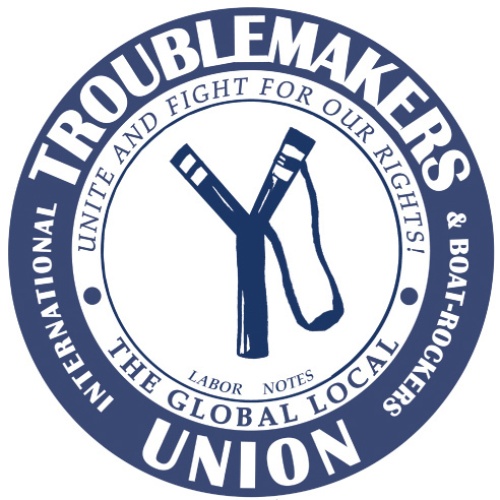Climate change is drowning out 'jobs vs. environment' debate

By Jenny Brown, Labor Notes
The old argument that unions must choose between jobs and the environment is losing its grip, as climate change becomes more evident and more urgent. More unions than ever have signed up to join environmentalists for a demonstration in Washington, D.C. against the Keystone XL tar sands pipeline on Sunday.
It's evidence of a sea change, at least among some unions, when it comes to global warming. Indeed, many are arguing that investment to prevent global warming is the real job-creator.
Nurses are demanding a "Robin Hood" tax on Wall Street, devoted to developing safe, green energy; auto workers are backing fuel efficiency standards; taxi drivers are embracing hybrids; and transport workers are lobbying for more mass transit while opposing dirty fuels.
The Utility Workers, who run power plants, are calling for "a serious commitment to climate change legislation," which they say will create two million good jobs.
And as the debate over TransCanada’s Keystone XL pipeline heats up again, the 120,000-member Communications, Energy, and Paperworkers union in Canada is opposing it more strongly than ever -- even though the CEP represents 35,000 workers in oil, gas extraction, and refining, including oil patch workers in Alberta, the very workers who mine the tar sands (for more on that, see "Meanwhile, in the oil patch").
Green = more jobs
In the U.S., investment in renewable energy creates more jobs than investment in capital-intensive fossil fuels. A University of California study showed that 5.65 jobs are created for every million dollars invested in solar energy, 5.70 in wind, and only 3.96 in coal.
A study of the 2009 stimulus package noted that investments in public transportation had created 31 percent more jobs, dollar for dollar, than those in new road construction.
Even the regulations long denounced by industry as job-destroying can turn out to be the opposite. The Environmental Protection Agency projected that new emissions standards it proposed in 2009 for coal power plants would create up to 31,000 construction jobs and 9,000 permanent utility jobs. But so far, the EPA has only applied new regulations to future plants.
Preparations for climate change could also generate jobs, say utility workers. New York's Consolidated Edison "has cut the workforce to the bone, and they don't invest," said John Duffy, national vice-president of the Utility Workers.
The New York City workforce of 8,500 that the company locked out last summer in a dispute over pensions has been winnowed to 7,700, Duffy said.
He said the union has found power poles dating back to the 1930s, though the company is supposed to replace them every 50 years and charges rates that are supposed to pay for upgrading.
When a storm like Sandy wreaks havoc on an already weakened system, managers just say, "Whoops, look what the storm did," Duffy said. Publicly owned power companies are better, he said, because private ones lobby against regulations requiring them to maintain equipment with appropriate staffing levels.
New tune
After many years of singing in harmony with their Big 3 employers against fuel efficiency, the Auto Workers union has changed tune, arguing that the recent 2012 regulations would create jobs.
Pollution-cutting technology requires "additional content on each vehicle," said UAW President Bob King at hearings considering the new corporate average fuel economy (CAFE) standards. "That additional content must be engineered and produced by additional employees."
In 2007 UAW's previous president Ron Gettelfinger had complained about changes to CAFE, calling them "the least desirable option for addressing the problems of climate change and energy security."
Shortly after King was elected in 2010, the UAW joined the BlueGreen Alliance, an effort to unite environmentalists and unions started by the Steelworkers and the Sierra Club in 2006. The Alliance now counts the Service Employees, Communications, Utility, Food and Commercial, Teachers (AFT), Plumbers, Amalgamated Transit, and Sheet Metal unions as members.
The BlueGreen Alliance calculated that the new CAFE standards would cut carbon emissions nearly in half for cars and light-duty trucks. The Alliance predicted that by 2030, when the standards have been fully implemented, they would create 50,000 jobs.
Bumpy road
The promise of jobs in the fossil fuel industry has caused splits among unions. The BlueGreen Alliance lost the Laborers union in the first fight over the Keystone XL pipeline in 2011.
Hamstrung by disagreement among member unions, the coalition declined to take a stand. But the Laborers pulled out anyway, angry that other coalition members had opposed a project they hoped would employ their members.
After the housing crash, some construction locals experienced 25 percent unemployment. The promise of "jobs now" was counterposed to possible climate impacts later -- and "jobs now" won.
The Keystone XL would run 2,000 miles, from Alberta to Texas, carrying a corrosive slurry of raw bitumen to refineries on the Gulf Coast. Tar sands mining produces a dirty fuel with a large carbon footprint that must be heated to mine it and diluted with other fuel to pipe it. Pipeline spills are not uncommon.
In Texas, the refined fuel would likely be put on ships for export. Because the pipeline crosses an international border, it needs U.S. government approval.
TransCanada has projected 20,000 construction jobs on the pipeline, while the State Department has estimated 6,000. The company promised construction unions it would hire their members, leading the Laborers -- with support from the Teamsters, Operating Engineers, and Plumbers (UA) -- to lash out at two transit unions who spoke out against Keystone XL and for green jobs.
Observers said other unions were deterred from speaking out on the pipeline after the construction unions' fierce criticism.
At one point the Laborers threatened to picket a U.S. talk by CEP President Coles.
Many climate activists rate the Keystone XL a hinge-point in the battle to lower carbon emissions. NASA climate scientist James Hansen says that exploitation of the tar sands "would make it implausible to stabilize the climate"; if tar sands are in the mix, "it's essentially game over."
With this in mind, making tar sands bitumen more difficult to mine and ship has become a top priority for U.S. climate activists, leading to 1,200 civil disobedience arrests at the White House in fall 2011. President (and then-candidate) Obama was convinced to delay the pipeline decision until after the election.
The Steelworkers, who helped found the BlueGreen Alliance and have argued actively for green jobs, didn't take a position during the 2011 protests. The steel for the pipeline could be fabricated by members in the U.S. and Canada, although some of it had already been ordered from India.
After Obama delayed the decision, USW issued a statement supporting the delay, but didn't mention climate change.
XL re-do
Now the pipeline has returned to the front pages as the administration considers the issue again. The Communications Workers are urging members to attend the February 17 demonstration, which they call "the largest U.S. climate rally ever," with the tagline, "Crippling drought. Devastating wildfires. Superstorm Sandy. Climate change is a real threat."
And the 185,000-member National Nurses Union came out against the pipeline in early February, joining the Amalgamated Transit Union and the Transport Workers Union.
"It's easy for us to take this position," said Jill Furillo of the 37,000-member New York State Nurses Association. "Our members are on the front lines of seeing the effects of the environmental crisis."
After Hurricane Sandy, New York nurses not only took care of those injured in the storm, they also evacuated patients from hospitals crippled by loss of electricity, carrying critically ill patients down dark stairwells when rising floodwaters wrecked elevators and backup generators.
A version of this article appeared in Labor Notes #408, March 2013. Don't miss an issue, subscribe today.
Tags
Labor Notes
Labor Notes is a media and organizing project that has been the voice of union activists since 1979.
